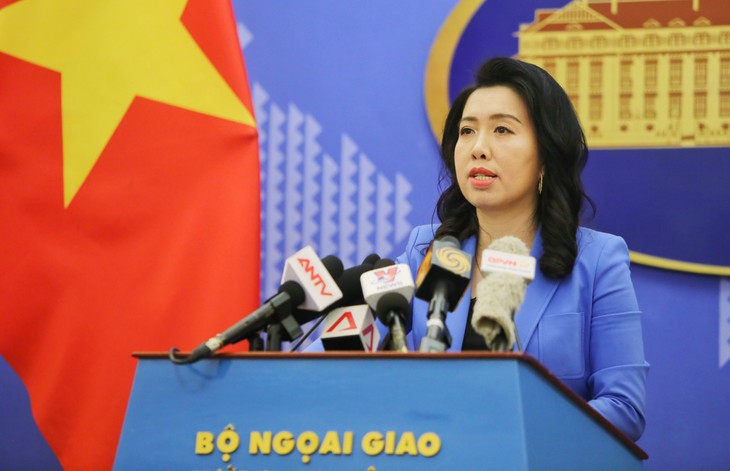All Vietnam’s maritime economic activities are deployed within Vietnam’s sovereign waters
(VOVWORLD) - Vietnam Foreign Ministry spokeswoman Le Thi Thu Hang has repeated Vietnam’s protest against the operation of a Chinese oil survey vessel and escort ships in Vietnam’s exclusive zone and continental shelf as a violation of Vietnam’s sovereignty.
 Vietnam Foreign Ministry spokesperson Le Thi Thu Hang Vietnam Foreign Ministry spokesperson Le Thi Thu Hang |
Speaking at a news briefing on Thursday, the spokeswoman said that Chinese oil survey vessel Haiyang Dizhi 8 and its escorts have continued seriously violating Vietnam’s sovereignty and jurisdiction right in Vietnam's exclusive economic zone and continental shelf. She said Vietnam’s sovereignty and jurisdiction over the waters are recognized by the 1982 United Nations Convention on the Law of the Sea (UNCLOS). The spokeswoman said Vietnam has made its point about the negative impacts caused by the operation of these vessels to the relations of the two nations as well as peace and stability in the East Sea: “Vietnam demands that China immediately stops this activity and remove the vessels. Regarding recent statements by China on Vietnam’s economic activities in Vietnamese waters, Vietnam has consistently affirmed that all of its maritime economic activities, including oil and gas exploitation, are deployed within the exclusive economic zone and continental shelf that completely belong to Vietnam, as defined by the United Nations Convention on the Law of the Sea, to which both Vietnam and China are signatories.”
Hang emphasized that the United Nations Convention on the Law of the Sea was the only legal basis for nations to identify their waters. This has been honored by all nations and is recognized by both international courts and reputed international lawyers. There is no nation that can make demands about waters in the East Sea that go beyond what has been regulated by the UNCLOS. Acts that hinder Vietnam's oil and gas activities in its waters are violations of international law and the UNCLOS.
Relating to the Committee to Protect Journalists’s recent report which includes Vietnam in the list of the world's 10 most censored country, the spokeswoman said Vietnam resolutely rejected untruthful information based on inaccurate and biased facts about the situation in Vietnam. She said freedom of speech and freedom of press in particular have been specifically defined in the 2013 Constitution and other relating legal documents. Vietnam has tried to improve its legal system to protect freedom of speech on the press, cyber space and other forms, especially shielding the public against fake news and inappropriate information in contrary to Vietnam’s fine tradition and customs as well as provocative and hatred distorted information.